


A comprehensive look at screenwriting, Writing Movies covers all the fundamentals (plot, character, scenes, dialogue, etc.) and such crucial but seldom discussed topics such as description, voice, tone, and theme. These concepts are illustrated through analysis of five brilliant screenplays: Die Hard, Thelma & Louise, Tootsie, Sideways, and The Shawshank Redemption. Also included are writing assignments and step-by-step tasks that take writers from rough idea to polished screenplay.

Screenwriting war stories from successful pros. For the screenwriter, the aspiring screenwriter or the movie and television fan who likes being in the know about what goes on behind the scenes in Hollywood, Doing It For Money fascinates, amuses and delights with insider stories from writers of The Big Easy, Field of Dreams, Ali, Shrek, Silence of the Lambs, Shakespeare in Love and TV shows as OZ, Sex and the City, Northern Exposure, Sesame Street, Home Improvement, China Beach, NYPD Blue, 24, Everybody Loves Raymond, XFiles and many more.
Here are insights into the process and the techniques of writing for a living, along with the agony, ecstasy, terror and triumph that go along with the endeavor. Included, too, are professional tips on writing the script, getting an agent, making a pitch, and dealing with impossible studio heads and stars. It all adds up to a lively look at Hollywood and the way things work there for screenwriters, an eye opener for both the pro and the fan!
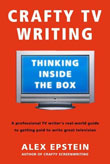
Everyone watches television, and everyone has an opinion on what makes a good TV show. But, as Alex Epstein shows in this invaluable guide, writing for television is a highly specific craft that requires knowledge, skill, and more than a few insider's tricks.
Epstein, a veteran TV writer and show creator himself, provides essential knowledge about the entire process of television writing, both for beginners and for professionals who want to go to the next level. Crafty TV Writing shows how to understand the hidden structure of a TV series so you can write it.
It explains the best ways to generate a hook, write an episode, create characters the audience will never tire of, construct entertaining dialogue, and use humor. It explains how to steer your way through the tough but rewarding television industry: from writing your first "spec" script, to getting hired to create a show, to surviving—even thriving—if you get fired. And it illuminates how television writers think about the shows they're writing, whether they're writing comedy, drama, or "reality".
Fresh, funny, and informed, Crafty TV Writing is the essential guide to writing for and navigating in the world of TV.

This ultimate insider's guide to screenwriting is designed to get you past the fiercest gatekeepers in Hollywood: the Hollywood script readers. This small army of freelancers will be among the first to read and evaluate your script and then to recommend it -- or not -- to the studios, directors, and stars. Designed for quick and easy access, these 500 points are a step-by-step recipe. They cannot guarantee success, but failure to follow them can almost certainly guarantee failure.
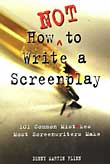
Having read tons of screenplays as an executive, Denny Martin Flinn has come to understand that while all good screenplays are unique, all bad screenplays are the same. Flinn's book will teach the reader how to avoid the pitfalls of bad screenwriting, and arrive at one's own destination intact. Every example used was gleaned from a legitimate screenplay. Flinn's advice is a no-nonsense analysis of the latest techniques for creafting first-rate screenplays that sell.
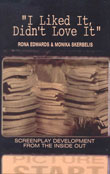
The most commonly used rejection line spewed by studio executive honchos when they do not buy a script is, "I liked it, didn’t love it." What happens to your screenplay or novel when it leaves your hands and is submitted to a studio or production company? What happens to it after it’s optioned or sold? What does "in development" really mean? Rona Edwards and Monika Skerbelis will shed light on all those questions for both those who are new to the business, and those already journeying through the "storied" halls at a film studio, television network, or production company.

If you've ever dreamed of writing a screenplay, The Screenwriter Within is the book for you. Insightful, inspirational, and wildly irreverent, it takes you through all the stages of the writing process, using references to hit movies and the author's personal experience to show you how to: Turn everyday events into big-screen successes, Find the best stories to turn into screenplays, Develop strong characters, Write compelling dialogue, Find your niche as a screenwriter . . . and much more.

Active New York literary agent Noah Lukeman, President of Lukeman Literary Management Ltd, has represented Pulitzer Prize winners, National Book Award Finalists, many New York Times bestsellers, and has written two bestselling books on the craft of writing, The First Five Pages and The Plot Thickens. He receives on average 10,000 query letters a year, and over his last 10 years as a literary agent, he has read nearly 100,000 query letters. Now, for the first time, he offers his insights on the query letter. In a new e-book, he shares an insider's perspective, gives insights and practical tips about what works and what doesn’t, about what will get you rejected, and what will give you success.
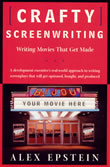
Most screenwriting books focus on how to write a "good" screenplay. But in the movie business, a screenplay isn't "good" unless it might one day get made into a movie. Crafty Screenwriting is the first book not only to offer a successful screenwriter's tricks of the trade, but to explain what development executives really mean when they complain that the "dialogue is flat," or "the hero isn't likeable."

Finally, a practical, no-nonsense look at the real secrets of creating, developing and maintaining a career in the unforgiving celluloid jungle. From concept to sale and beyond, it’s the four-one-one on how to write to impress the people who’ve seen it all before – Hollywood’s agents, producers, and studio executives. This book is a must-have for anyone who is serious about writing feature films – and getting paid for it!

This fully revised guide to turning your movie idea into a treatment that can help all passionate screenwriters persuade even the most jaded movie producers. Hollywood insiders know that the first step in selling your story idea for film or television is preparing a treatment, the brief pitch that sells the concept of your idea to a busy producer or agent. This second edition of one of the Writers Store’s best-selling screenwriting books now includes updates on the latest trends in the industry. Writers-producers Kenneth Atchity and Chi-Li Wong tell readers everything they need to know to create an effective and saleable treatment, by incorporating such key elements as conflict, likeable characters, plot twists, a climax, and visual drama.

It's here--- the book everyone’s been waiting for from the acknowledged master storyteller and teacher Robert McKee. His award-winning methods, taught to thousands of students in his popular workshops, have provided real results as students go from his workshops to write, direct or produce outstanding television and feature productions. McKee is not only an accomplished and successful screenwriter with many teleplays to his credit, but also a Ph.D. in cinema arts and a Fulbright scholar. His ability to translate the story process to aspiring writers is the core reason his courses are viewed as indispensable for all theatrical personnel. He shares his deep understanding of characterization, and his clear vision of form, not formula, as the key to his idea of dynamic screenwriting. Using examples from more than 100 films, McKee starts with the basics and unravels the mysteries of standard dramatic structure and atypical structures to expose their limitations and importance. The commentary on theme, setting, atmosphere, character vs. characterization, and his problem/solution insights are worth the price of the book alone. He has rightfully earned the designation as the Stanislavski of writing. A must read!
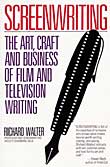
With wit and common sense, Walter offers you the same expertise he's given thousands of students who attend his legendary lectures at UCLA and refer to him as the screenwriters' guru. His highly-prized curriculum is now available as a how-to manual that will help you grasp the most important elements of screenwriting; deal with violence and sex; understand the difference between real and reel stories, and many other rules for scriptwriting essentials from dialogue to plot to character development. This is the A-B-C of the medium. Entertaining and informative.

This is the classic text on discovering what they want, who to see, and what to do afterwards. Field helps you analyze where to market, studios or the independents; how to connect with networks, or cable; how to get an agent, and why you need an attorney before you sign the contract. Frank, information-packed, essential basics for everyone in the industry. Interviews with today's top screenwriters gathered by the author of Screenplay and Four Screenplays.

To paraphrase an old line, "Writing a screenplay is easy. Getting it signed is hard." In today's topsy-turvy world of film production, getting a screenplay sold and produced is no picnic, even for veterans. For novices, it's near impossible. To play the film game, you need to know the rules. How to Sell Your Screenplay not only lets you in on the rules, but also lets you in on the secrets of winning the game. Written by two veteran screenwriters, How to Sell Your Screenplay was designed as a complete guide to getting your screenplay seen, read, and sold.
